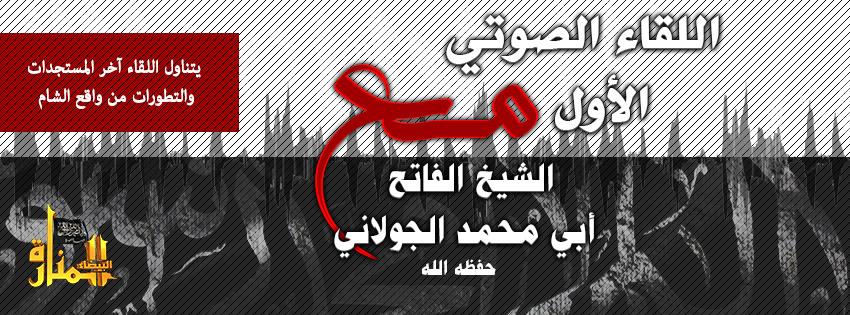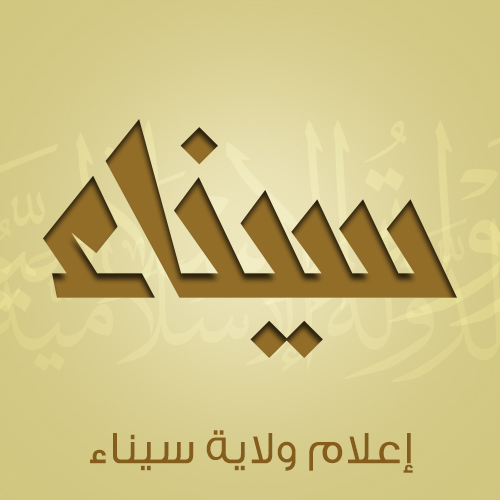
Click the following link for a safe PDF copy: The Islamic State — “Operations During the Month of November – Wilāyat Sīnā’ (Sinai)”
_________
To inquire about a translation for this statement for a fee email: [email protected]
Month: November 2014
New video message from The Islamic State: "Storming the Gate of Murshid Bīnār By the Army of the Caliphate – Wilāyat al-Raqqah"
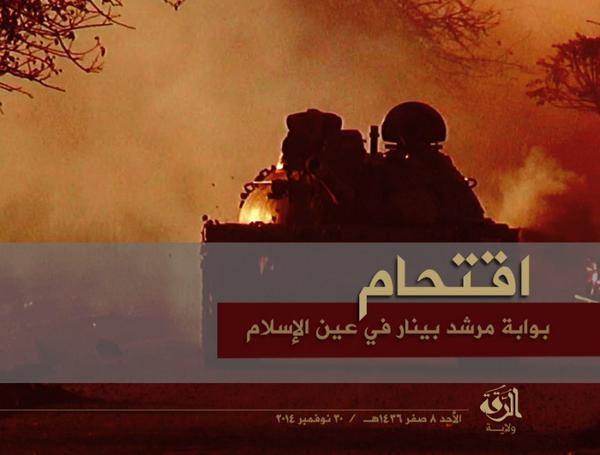
_________
To inquire about a translation for these video messages for a fee email: [email protected]
The Clear Banner: Belgian Fighters In Syria and Iraq – November 2014
NOTE: For prior parts in the Clear Banner series you can view an archive of it all here. Also for earlier updates on Belgian foreign fighters see: September 2013, January 2014 I and II, and May 2014.
—
Belgian Fighters In Syria and Iraq – November 2014
By Pieter Van Ostaeyen
Some demographics:
Islam is the largest minority religion in Belgium, it is estimated that about 6% (about 630.000 people) of Belgium’s total population are Muslims. In the 1960’s, when Belgium still was recovering from the total devastation of World War II, the country invited thousands of Moroccan and Turkish immigrants to work in the heavy industry which at that time dominated the Belgian economy. Most of these unschooled people had relatively well-paid jobs in the steel industry or coal mines. The guest-worker program was abolished in 1974, yet a lot of these people stayed in Belgium and brought in their families taking use of the family reunification laws. Today the Muslim population keeps on growing due to marriage migrations.
In 1974 Islam was officially recognized by the Belgian government as a subsidized religion; from 1996 onwards the Belgian Muslim community has been represented by the Muslim Executive of Belgium.1 Although this first generation of Muslims seems to have integrated quite well in Belgium, this surely doesn’t stand for their children and grandchildren. Cities like Antwerp, Mechelen, Vilvoorde, and Brussels now have important minorities of descendants of these guest-worker immigrants. As such one would say this isn’t problematic at all, taking into respect on how their parents and grandparents managed to build a career and family.
However, in the 1980’s and 1990’s Belgium started facing increasing problems and mishaps with its Muslim immigrant community. Cities like Mechelen in the 1990’s were known as hubs of petty theft and drug dealing (especially by Moroccan Berbers dealing hashish). More and more of these youngsters were cruising the city with expensive cars like BMW’s and Mercedes’s. It was commonly known these cars were paid with drug-money. At that time, the city of Mechelen was referred to as ‘Chicago at the river Dijle’2, due to its extreme crime rates. Other Flemish cities were facing the same problem. In Antwerp the district of Borgerhout was known as Borgerokko because of its high amount of inhabitants from Maghrebi origin. Brussels, Belgium’s capital, had entire no-go zones. It is in this climate of fear and mutual mistrust that extreme right wing parties like Vlaams Blok (now Vlaams Belang) thrived. On the federal elections of Sunday November 24th, 1991, out of the blue Vlaams Blok gained around 6.5 % of the votes. The tone of voice was set for the years to come; using slogans like ‘adapt or get lost’, Vlaams Blok profited highly from the general mistrust amongst the Belgian public towards the Muslim community.
In the course of the next few years Vlaams Blok started building up its anti-Islamic theme, criticizing Muslims on head scarves, the slaughter of sheep on ‘Eid festivities and the fact they didn’t manage to integrate in our society. They easily disregarded the fact it was mainly because of political parties and narratives as their own that the Muslim society in Belgium had little or no chance to assimilate or let alone integrate. In the course of the next few years Vlaams Blok was forbidden and reappeared as Vlaams Belang. As such the name was dropped but the rhetoric remained the same; intolerance and latent racism in Flanders grew steadily.
It should be noted that well before Belgium was confronted with its huge amount of fighters engaged in the war in Syria (and later Iraq), the country already was a main supplier of Jihadist Fighters. On September 10th, 2001, the suicide attack on Ahmed Shah Masoud, leader of the Northern Alliance in Afghanistan was conducted by a Belgian Muslim. And even before 9/11 Belgians played a quite important role in international Jihad. Several Belgians were engaged in GICM (Groupe Islamiste Combattante Marrocaine) and GIA. Shaykh Bassam al-Ayashi, the oldest Belgian fighter in Syria, who once was suspected to be a main al-Qaeda recruiter now is leading his own little branch of Suqur as-Sham in Northern Syria.
As one of the main reasons for all, these Belgians involved all refer to the Belgian policy on its inaptitude to integrate the Muslims in our democratic society. These guys don’t see us as being democratic; they rather see how Muslims are being oppressed on what they consider to be their basic rights. The fact that Belgium forbad the face-veil or Niqab, headscarves are forbidden in schools and in public service, next year private Halal-slaughter will no longer be allowed, and so on. It is a message even confirmed by Sharia4Belgium’s spokesman Fouad Belkacem. In a statement he recently published from prison, he states: If I look back upon these days I think about the arrogance and the deep-rooted islamophobia of the Belgian State […] The head-scarf ban in 2009 hit us like an atom bomb […] For almost 50 years we saw humiliated Muslims beg for basic rights […].3
It is in reaction to these general sentiments that Sharia4Belgium was founded on March 3 2010. The group was inspired by other European Salafi groups that already existed such as Islam4UK, at that time led by the radical Islamist preacher Anjem Choudary. In its founding notes Islam4UK stated: [the group was] established by sincere Muslims as a platform to propagate the supreme Islamic ideology within the United Kingdom as a divine alternative to man-made law, and to convince the British public about the superiority of Islam […] thereby changing public opinion in favor of Islam in order to transfer the authority and power […] to the Muslims in order to implement the Shari’a (in Britain).4 A very similar discourse was spreading among radical Muslims in Belgium. As such, Sharia4Belgium copied a lot of the rhetoric of Anjem Choudary and other inspiring leaders of Islam4UK. Sharia4Belgium denounced democracy and stated it wanted to introduce the Shari’a in Belgium.
Fouad Belkacem explains in his statement who is leaving for Jihad in Syria:
A. The Migrants for the case of Allah. These believers seek to please Allah wherever possible. They believe that the highest value after worshipping the unity of Allah is the blessed Jihad. Jihad doesn’t mean Holy War, this term stems from Christianity and its Crusades. May Allah give this brothers what they seek.
B. The Migrants against suppression. They are the ones who left because of the injustice they daily lived in Belgium. A lot of practicing Muslims every day feel the injustice from the government and society.
C. A new live, a new beginning. A lot left for Syria to start a new life. The fact that a lot of youngsters prefer to live under bombs than in “hospitable, warm Flanders” as such is another proof against the government. Everything seems better than Belgium.
D. Sense of justice. The last group is that of the pious Muslims who could no longer bear the injustice done to their brothers. They want to contribute, how futile it may be.5
This general resentment against Belgiums policy against its Muslim community is also confirmed by the Belgian researcher Montasser AlDe’emeh. In the Belgian weekly Knack of September 23, 2014, Montasser published part of his interviews with a Belgian Islamic State fighter:
In Belgium daily they make new laws against Muslims. A Niqab ban, a headscarf ban and soon maybe a ban on beards and some Mosques? Why can’t our sisters wear a headscarf? […]Politicians, teachers at school, people at work, they
GUEST POST: The Different Functions of IS Online and Offline Plegdes (bay'at): Creating A Multifaceted Nexus of Authority
New video message from The Islamic State: “Charge of the Supporters #1 – Wilāyat Saynā’ (Sinai)”
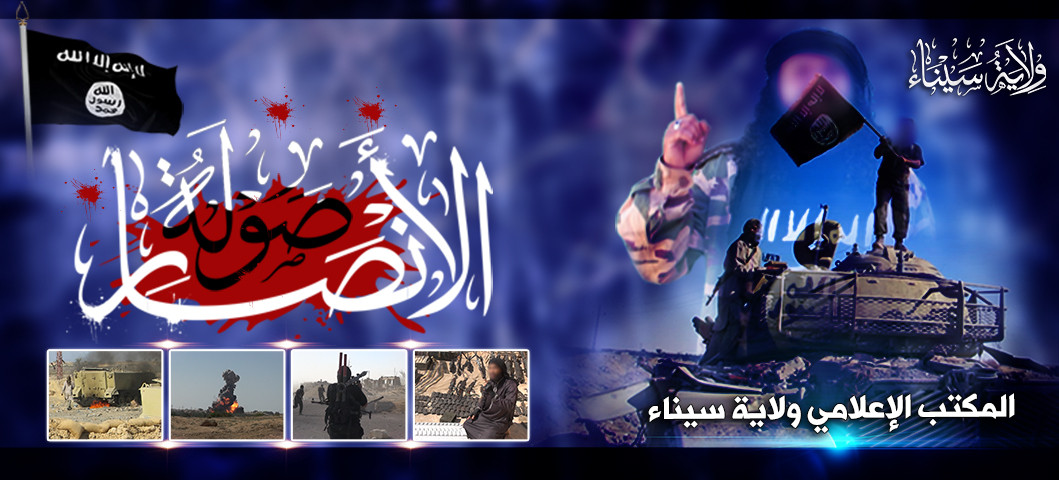
________________
Source: Twitter
To inquire about a translation for this video message for a fee email: [email protected]
Check out my new 'Policy Alert' for The Washington Institute: "The Islamic State's Archipelago of Provinces"
This week, Abu Bakr al-Baghdadi, the leader of the Islamic State of Iraq and al-Sham, released a rare public message in which he declared the creation of several new “provinces” in various Arab countries. It was the first time that he and his organization have acknowledged groups that have pledged baya (religiously binding oath of allegiance) to the so-called “Islamic State” since the announcement of its “Caliphate” six months ago. The audio message offers insight into the group’s expansion model and its plans for exacerbating religious tensions between Sunnis and Shiites beyond Iraq, Syria, and Lebanon. Whether Western governments want to admit it or not, the reality is that the Islamic State has expanded in a non-contiguous manner outside its base and now has authority over satellite groups and small amounts of territory outside Iraq and the Levant.
Click here to read the rest.
As-Saḥāb Media presents a new video message from al-Qā’idah in the Indian Subcontinent: "Message on Behalf of the People of Pakistan and Our Brothers the Fighting Mujāhidīn There Are Now Coming to Fight For Ustāẓ Aḥmad Fārūq"
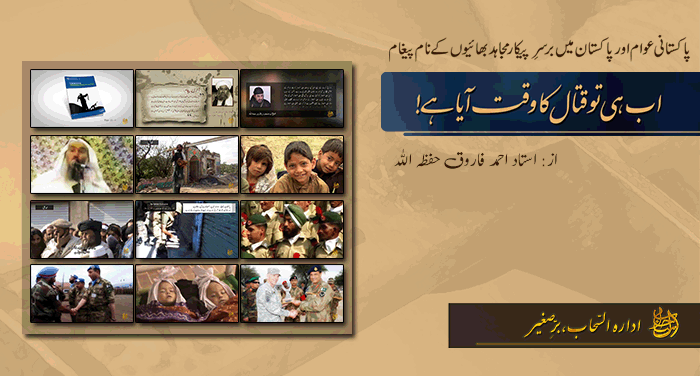
_______________
To inquire about a translation for this video message for a fee email: [email protected]
New audio message from Jamā’at Anṣār Bayt al-Maqdis: “Pledging Allegiance To the Caliph of the Muslims and Joining The Islamic State”
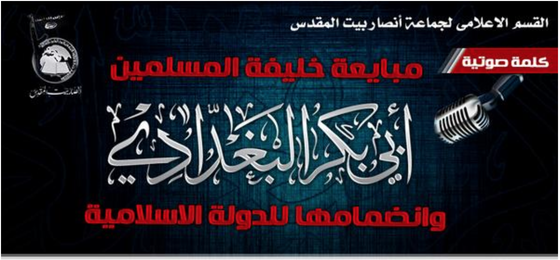
______________
Source: Twitter
To inquire about a translation for this video message for a fee email: [email protected]
As-Saḥāb Media presents a new video message from al-Qā’idah’s Mawlānā ‘Aṣim ‘Umar: "On the Occasion of the Martyrdom of Shaykh 'Imrān 'Alī Ṣadīqī (Ḥājī Walī Allah)"
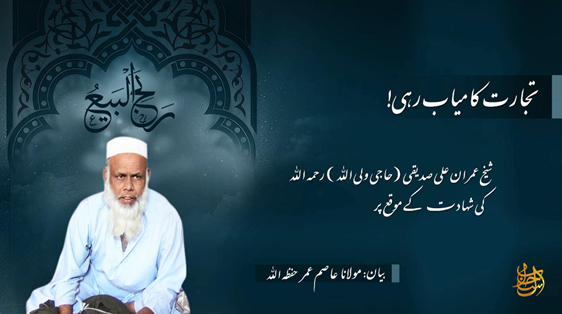
________________
To inquire about a translation for this video message for a fee email: [email protected]

